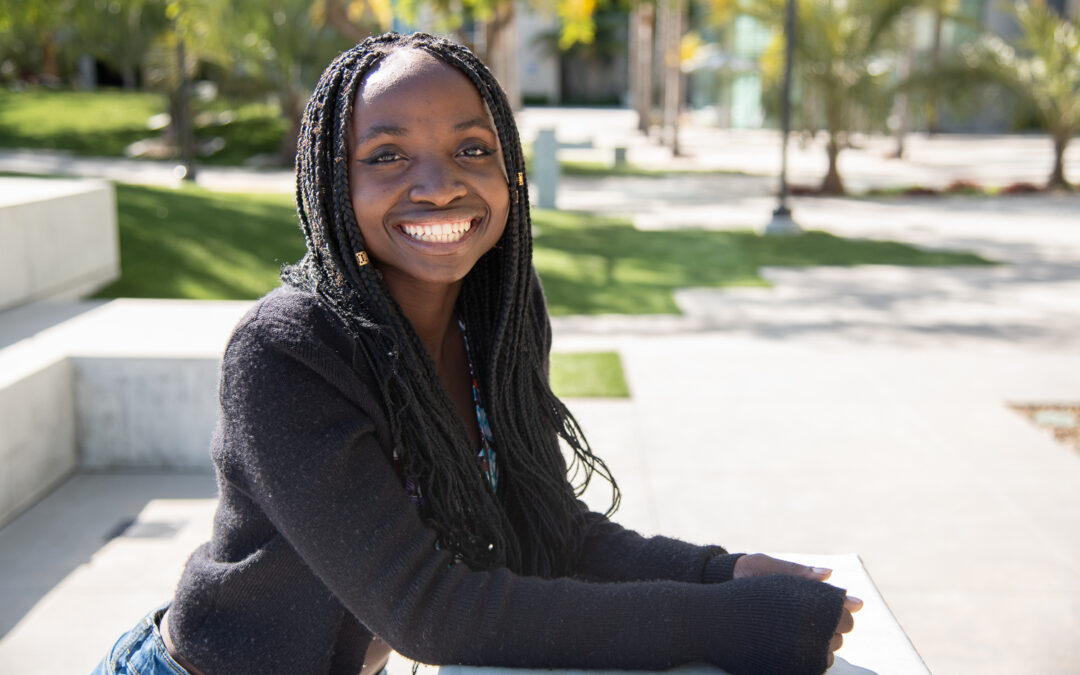RANCHO BERNARDO — For most Americans who discover 17-year-old Joyce Orishaba’s story—at least for the next year or two—it will begin like this: “I am six years old, sleeping with nothing but a banana leaf over my shoulders to keep me warm.”
That’s the opening line of Orishaba’s 100-word essay, entitled “A River Runs Through Me,” which was chosen as one of 13 winners in the New York Times Personal Narrative Contest, a competition open to teenagers submitting “miniature memoirs” last year.
It’s a rich and vivid memory, in the present tense, out of a childhood in one of Africa’s poorest tribes—the displaced Batwa people in southwest Uganda.
Orishaba said it wasn’t her idea to write for the contest, “but when I really thought about what it would mean to win, I felt that God was giving me a window—like, ‘You’ve been waiting for this, and it’s going to happen.’ We will get there.”
Orishaba is a junior at Poway to Palomar Middle College (PPMC), a high school that meets at Palomar College’s Rancho Bernardo Education Center.
“My thought has always been that I want to go back and spend time with my people—doing something useful, but also just being with them,” Orishaba said, explaining why she decided to try PPMC.
Every year she spends in college in the U.S., she said, is a year she won’t be able to spend in Uganda: “When mom told me about this school, where I can get some of my college classes done while I’m still in high school, I decided to enroll,” she said.
Orishaba grew up in Kalehe, a village on the northern border of Bwindi Impenetrable National Park, a famous preserve of thickly-forested hills known for its population of mountain gorillas.
Her adoptive mother, Wendee Nicole, met Joyce when she was 7 and living in intense poverty. Nicole fostered the girl at age 9 and adopted her when she was 10.
“When they created the national park to save the mountain gorillas, in 1991, they kicked her people out,” explained Nicole, who founded and runs the nonprofit Redemption Song Foundation Uganda. “The Batwa lived in the forest—it was where they hunted, where their ceremonial sites were, where they collected honey and yams—but in 1991, it was a hard eviction. They went in with guns, they kicked the people out and gave them nothing—no land, no compensation.”
The displacement was a devastating blow for the Batwa tribe, which has struggled to make a life outside of the forest and remains the target of discrimination and exploitation.
Orishaba said she felt the impulse to tell the story of her people while watching an episode of the TV news program “60 Minutes,” which was featuring the Bwindi gorillas one night last year.
“We used to live in the same forest,” but there was no mention of the tribe, she said. “They should include the fact that the people who used to live there are now suffering.”
Although not a natural writer, Orishaba does love to tell stories, so one night, Nicole told her to start talking about her story and said, “Write that down,” any time she said something that should be in her “miniature memoir” for the contest.
“After two months we hadn’t heard anything. I didn’t know what a runner up was. I had already given up,” she recalled. “Then mom came in with the news that I actually won.”
The past month, since learning her essay had won, has been a whirlwind of media requests and other opportunities. Orishaba will be the keynote speaker at the San Diego Women’s Week Leadership Conference on Thursday, March 2, 2023 at the Rancho Bernardo Inn.
Orishaba is now launching an initiative called “Discover the Lost Tribe,” which she envisions as an ambassadorship program to bring young Americans to her village in Uganda.
She believes bringing young people together will raise awareness overseas, and to expose young Batwa people to the outside world and give them a vision for their future beyond the limits that have been set for them by their circumstances and the prejudices of others.
“I want us to share our stories, to open the world for others the way it’s been opened for me,” she said, echoing the last two lines of her award-winning essay: “I will be the river for my people. I am the future.”Orishaba’s work can be followed on Instagram.

